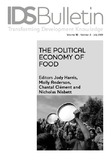Agroecology and Food Sovereignty
| dc.contributor.author | Gliessman, Steve | |
| dc.contributor.author | Friedmann, Harriet | |
| dc.contributor.author | H. Howard, Philip | |
| dc.date.accessioned | 2019-07-30T08:49:58Z | |
| dc.date.available | 2019-07-30T08:49:58Z | |
| dc.date.issued | 2019-07-30 | |
| dc.identifier.citation | Gliessman, S., Friedmann, H. and Howard, P. H. in 'Agroecology and Food Sovereignty' in Harris, J., Anderson, M., Clément, C. and Nisbett, N. (Eds) The Political Economy of Food, IDS Bulletin 50.2, Brighton: IDS | en |
| dc.identifier.uri | https://opendocs.ids.ac.uk/opendocs/handle/20.500.12413/14606 | |
| dc.description.abstract | We propose that agroecology provides a framework for understanding ‘levels’ for the transition to sustainable food systems. If we agree that agroecology includes social and political dimensions of governing territorial food systems, then it must be linked to movements for food sovereignty. However, the concentration of power in food and farming systems locks in industrial logic, posing immense barriers to agroecological and social transition. This creates a tension between efforts at convergence of food system innovations from below, versus co-optation of grass-roots language and practices by private and public actors who are committed not to changing the logic of industrial agriculture, but instead to reducing its harm. We suggest agroecological and food sovereignty movements consciously embrace this tension as a dance of creativity and appropriation. If this dance can be made generative rather than deadly, it can open pathways for transition to new ways of seeing, experiencing, and getting food. | en |
| dc.description.sponsorship | International Panel of Experts on Sustainable Food Systems (iPES Food) | en |
| dc.language.iso | en | en |
| dc.publisher | Institute of Development Studies | en |
| dc.relation.ispartofseries | IDS Bulletin;50.2 | |
| dc.rights | This is an Open Access article distributed under the terms of the Creative Commons Attribution Non Commercial 4.0 International licence (CC BY-NC), which permits use, distribution and reproduction in any medium, provided the original authors and source are credited, any modifications or adaptations are indicated, and the work is not used for commercial purposes. http://creativecommons.org/licenses/by-nc/4.0/legalcode | en |
| dc.rights.uri | http://creativecommons.org/licenses/by-nc/4.0/ | en |
| dc.subject | Nutrition | en |
| dc.title | Agroecology and Food Sovereignty | en |
| dc.type | Article | en |
| dc.rights.holder | Institute of Development Studies | en |
| dc.identifier.team | Health and Nutrition | en |
| dc.identifier.doi | 10.19088/1968-2019.120 | |
| dcterms.dateAccepted | 2019-07-30 | |
| rioxxterms.funder | Default funder | en |
| rioxxterms.identifier.project | Default project | en |
| rioxxterms.version | VoR | en |
| rioxxterms.funder.project | 9ce4e4dc-26e9-4d78-96e9-15e4dcac0642 | en |
Files in this item
This item appears in the following Collection(s)
Except where otherwise noted, this item's license is described as This is an Open Access article distributed under the terms of the Creative Commons Attribution Non Commercial 4.0 International licence (CC BY-NC), which permits use, distribution and reproduction in any medium, provided the original authors and source are credited, any modifications or adaptations are indicated, and the work is not used for commercial purposes. http://creativecommons.org/licenses/by-nc/4.0/legalcode


